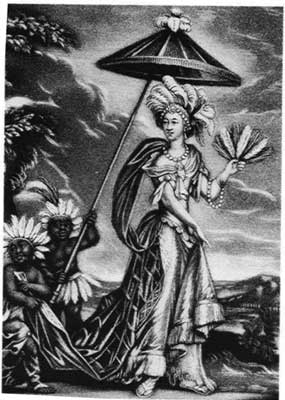The Indian Queen

Anne Bracegirdle as Semernia, another Indian Queen in the play The Widow Ranter. The original play of The Indian Queen, written by Robert Howard and John Dryden, was premiered in 1664. In 1694 Thomas Betterton was given £50 to transform it into an opera, and he commissioned Henry Purcell to compose the music. Sadly, Henry died in 1695 and the performance history of the piece is uncertain. There are several sources for the music and words but a certain amount of editing is necessary to work out exactly how they fit together. However, the central scene of Act III, where Zempoalla visits her sorcerer Ismeron is a small masterpiece of music-theatre, integrating song and speech in a way no-one else quite managed to do until the advent of the American musical.
For an overview of Purcell and the Theatre click here
In 1994 the Scottish Early Music Consort mounted a production of The Indian Queen at the Citizens Theatre in Glasgow. For a picture click here, for reviews click here, for an article on making the edition click here.
| Synopsis The story so far The whole action takes place in the New World, in the years before the Spanish Conquest. Some twenty years or so ago, Amexia, the Queen of Mexico, became pregnant. Her husband’s sister, Zempoalla, was devoured by ambition – she herself had a young son – and arranging for her love Traxalla to kill the King, then exiled the rightful Queen and proceeded to rule with force where her brother had ruled with love. However, in the course of time, others also cast envious eyes on the rich realm of Mexico, and just before the play opens, the Inca of Peru has invaded. His armies, led by the brilliant stranger Montezuma, have just won three pitched battles. Overture and Prologue An Indian Boy and Girl lament the destruction of war, but see in the audience their own future, The trumpet’s playing brings, however, the arrival of the invading Peruvians, together with their prisoners who include the Mexican prince Acacis, son to the Queen Zempoalla. Act I The Inca refuses to give Montezuma the hand of his daughter Orazia as a reward for his success. Furious, Montezuma resolves to change sides and fight for the Mexicans. Acacis, whom he has freed, remonstrates with him, pleading honour and duty (even against Acacis’s own interests), but in vain. Act II The Inca and Orazia are escaping from the Mexican army, given new heart by the defection of Montezuma. Traxalla’s soldiers capture them, but are forced to give them up to Montezuma, who is the real author of the victory. Act III The Triumph of Fame over Envy is interrupted by the arrival of Montezuma and Acacis, both of them furious at the treatment of Orazia and the Inca. Zempoalla would like to execute Montezuma too, but finds she cannot bear to – she has fallen in love with him though she must not admit it. Acacis pleasd for the lives of the prisoners, but Zempoalla’s vow cannot be set aside. Act IV Orazia in prison meditates on her sufferings. Traxalla offers to save Montezuma’s life, if Orazia will give herself to him. Neither Montezuma nor Orazia will agree to this, and Traxalla attacks Montezuma. Zempoalla arrvies, suspicious (with good reason) of Traxalla’s motives, and threatens to stab Orazia if Traxalla wounds Montezuma. She asks Montezuma to love her in return for the gift of his life. However, both Montezuma and Orazia prefer death to life on those terms, and Zempoalla orders the sacrifice to be prepared. Act V The priests prepare the sacrifice to the God of War. Acacis, desparing of gaining Orazia’s love, kills himself. Messengers announce the imminent arrival of the rightful Queen Amexia, and that Montezuma is her long lost son. Zempoalla goes to kill Montezuma, but releases him instead; Traxalla goes to kill him but is despatched by him. The true Queen arrives together with Montezuma’s fosterfather Garruca, and all is recounted. Zempoalla, bereft of everything, kills herself. Masque (music by Daniel Purcell) Ismeron and the Mexicans celebrate by offering a wedding masque to Montezuma and Orazia. Marriages that have gone wrong are healed by the power of love in a jolly romp by Henry’s brother Daniel (written after Henry’s death) that nevertheless can be seen to have interesting parallels to the Prologue. |



